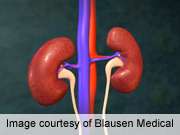Personalized fluid levels cuts acute kidney injury

(HealthDay)—A new fluid protocol is safe and effective in preventing contrast-induced acute kidney injury in patients undergoing cardiac catheterization, according to a study published in the May 24 issue of The Lancet.
Somjot S. Brar, M.D., from Kaiser Permanente in Los Angeles, and colleagues conducted a phase 3 trial involving 396 adult undergoing cardiac catheterization (with an estimated glomerular filtration rate of ≤60 mL/min/1.73 m² and one or more of several risk factors). Patients were randomized (1:1) to either left ventricular end-diastolic pressure-guided volume expansion (196 participants) or a control group where they received a standard fluid administration protocol (200 participants).
The researchers found that contrast-induced acute kidney injury occurred less frequently in patients in the left ventricular end-diastolic pressure-guided group (6.7 percent versus 16.3 percent in the control group; relative risk, 0.41; P = 0.005). Shortness of breath occurred in three patients in each group, requiring hydration treatment to be prematurely terminated.
"Left ventricular end-diastolic pressure-guided fluid administration seems to be safe and effective in preventing contrast-induced acute kidney injury in patients undergoing cardiac catheterization," the authors write.
More information:
Abstract
Full Text (subscription or payment may be required)
Editorial (subscription or payment may be required)
Copyright © 2014 HealthDay. All rights reserved.
















